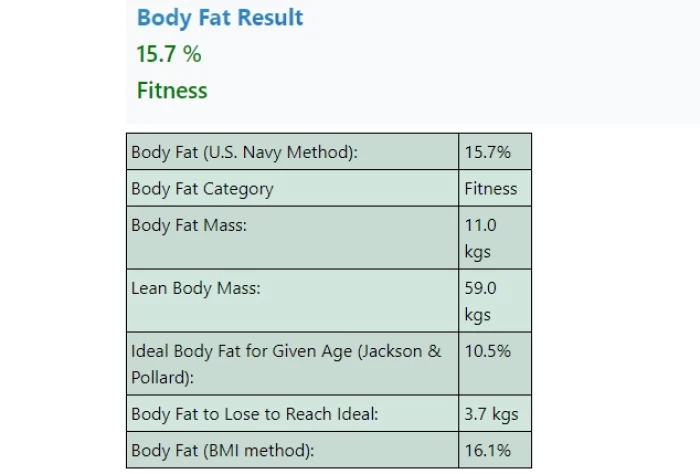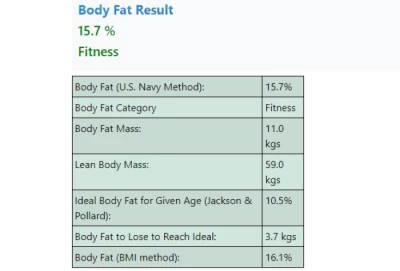Body Fat Calculator: Your Journey to Fitness
Embark on your fitness journey with the Body Fat Calculator, your trusted companion in achieving optimal health. This intuitive tool provides accurate assessments of your body fat percentage, guiding you towards informed fitness goals

Your body is a complex machine, and much like a car needs the right fuel to function optimally, your body requires the right balance to stay healthy. Now, let's delve into a crucial aspect - body fat. Did you know that excess body fat is linked to a range of health issues, from heart problems to diabetes? Yes, it's more than just a number on the scale; it's a key player in your overall well-being. Studies show that carrying excess body fat affects not only how you look but also how your body functions. It's not just about fitting into those jeans; it's about ensuring your body runs like a well-oiled machine.
Body Fat Calculators:
Now, how do we measure this critical factor? Enter body fat calculators - the unsung heroes of health assessments. These tools go beyond the traditional scale, providing insights into your body composition. They consider factors like muscle mass and distribution, offering a more accurate picture of your health. Why bother understanding your body fat percentage, you ask? Well, think of it as your body's report card. Knowing your body fat percentage is like having a roadmap to better health. It guides you in setting realistic fitness goals, helping you tailor your diet and exercise routine for maximum effectiveness.
Body Fat Basics:
Body fat is the additional substance in our bodies beyond muscles, bones, and organs, serving as an energy reserve. There are two main types of body fat: essential fat, crucial for proper bodily functions and found in organs and nerves, and storage fat, which represents the excess fat we carry around, potentially impacting our health.
Ideal Body Fat Percentages:
The ideal amount of body fat varies, but there are general ranges to consider. For men, a percentage between 6-24% is typically acceptable, with athletes often falling on the lower end. Women usually have a normal range of 16-30%, while athletes might maintain a lower percentage. Athletes, in general, tend to have lower body fat percentages, ranging from 6-20%. You can keep your body fat within a healthy range by adopting the following tips:
- Eat Healthy Foods: Choose fruits, vegetables, whole grains, and lean proteins. Avoid too much junk food, sugary drinks, and snacks.
- Watch Portion Sizes: Only eat a little at a time. Pay attention to how much you put on your plate.
- Stay Active: Exercise regularly. This could be walking, running, biking, or any activity you enjoy. Aim for at least 150 minutes of moderate-intensity exercise per week.
- Drink Water: Drink plenty of water instead of sugary drinks. It helps control your appetite and keeps you hydrated.
- Get Enough Sleep: Aim for 7-9 hours of sleep each night. Lack of sleep can affect your body fat.
- Limit Processed Foods: Processed foods often contain extra sugars and unhealthy fats. Try to eat fresh, whole foods.
- Monitor Your Body Fat: Keep track of your body fat regularly. This can be done with scales, callipers, or other tools.

How Body Fat Affects Health and Fitness:
Maintaining an appropriate level of body fat is crucial for overall health and fitness. Excessive body fat can contribute to health issues such as heart disease and diabetes. On the other hand, insufficient body fat, especially in women, can lead to hormonal imbalances and other health complications. Athletes need to strike a balance as well, as both too little and too much body fat can influence their performance. If you want to see other calculators, you can visit CoolCalculator.

Your body is a complex machine, and much like a car needs the right fuel to function optimally, your body requires the right balance to stay healthy. Now, let's delve into a crucial aspect - body fat. Did you know that excess body fat is linked to a range of health issues, from heart problems to diabetes? Yes, it's more than just a number on the scale; it's a key player in your overall well-being. Studies show that carrying excess body fat affects not only how you look but also how your body functions. It's not just about fitting into those jeans; it's about ensuring your body runs like a well-oiled machine.
Body Fat Calculators:
Now, how do we measure this critical factor? Enter body fat calculators - the unsung heroes of health assessments. These tools go beyond the traditional scale, providing insights into your body composition. They consider factors like muscle mass and distribution, offering a more accurate picture of your health. Why bother understanding your body fat percentage, you ask? Well, think of it as your body's report card. Knowing your body fat percentage is like having a roadmap to better health. It guides you in setting realistic fitness goals, helping you tailor your diet and exercise routine for maximum effectiveness.
Body Fat Basics:
Body fat is the additional substance in our bodies beyond muscles, bones, and organs, serving as an energy reserve. There are two main types of body fat: essential fat, crucial for proper bodily functions and found in organs and nerves, and storage fat, which represents the excess fat we carry around, potentially impacting our health.
Ideal Body Fat Percentages:
The ideal amount of body fat varies, but there are general ranges to consider. For men, a percentage between 6-24% is typically acceptable, with athletes often falling on the lower end. Women usually have a normal range of 16-30%, while athletes might maintain a lower percentage. Athletes, in general, tend to have lower body fat percentages, ranging from 6-20%. You can keep your body fat within a healthy range by adopting the following tips:
- Eat Healthy Foods: Choose fruits, vegetables, whole grains, and lean proteins. Avoid too much junk food, sugary drinks, and snacks.
- Watch Portion Sizes: Only eat a little at a time. Pay attention to how much you put on your plate.
- Stay Active: Exercise regularly. This could be walking, running, biking, or any activity you enjoy. Aim for at least 150 minutes of moderate-intensity exercise per week.
- Drink Water: Drink plenty of water instead of sugary drinks. It helps control your appetite and keeps you hydrated.
- Get Enough Sleep: Aim for 7-9 hours of sleep each night. Lack of sleep can affect your body fat.
- Limit Processed Foods: Processed foods often contain extra sugars and unhealthy fats. Try to eat fresh, whole foods.
- Monitor Your Body Fat: Keep track of your body fat regularly. This can be done with scales, callipers, or other tools.

How Body Fat Affects Health and Fitness:
Maintaining an appropriate level of body fat is crucial for overall health and fitness. Excessive body fat can contribute to health issues such as heart disease and diabetes. On the other hand, insufficient body fat, especially in women, can lead to hormonal imbalances and other health complications. Athletes need to strike a balance as well, as both too little and too much body fat can influence their performance. If you want to see other calculators, you can visit CoolCalculator.
Conversation
Latest Blogs
© Blog CoolCalculator, Explore CoolCalculator, your destination for the latest insights, tips, and updates on the world of online calculators. Stay informed and make your calculations smarter with our blog. ,
Designed
by Saad Media Team , Team Lead M.Rizwan Akhtar












